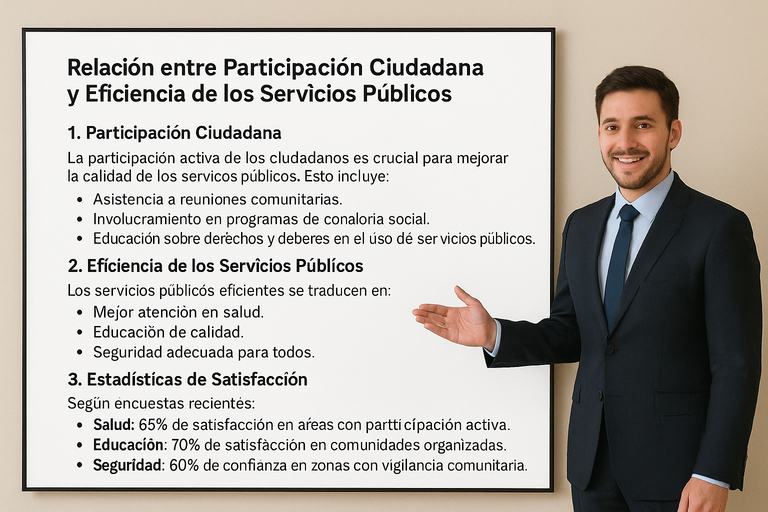Mensaje diario de 5 minutos. La participación ciudadana y los servicios públicos. Esp/En.

Imagen realizada por la IA para este texto.

Pront: Confianza en el sistema.
Uno de los puntos más interesantes para las sociedades, es lograr que sus sistemas de seguridad y de servicios públicos funcionen, y aunque muchos políticos y tecnócratas viven diciendo que los servicios públicos son solo un gasto para el Estado, la ciudadanía en general, siempre aspiran a que estos funcionen y que su funcionamiento sea eficiente.
Es muy cierto, también, que cuando habla de servicios públicos eficientes, puede ser acusado de ser impulsor del Estado de Bienestar, y en mi caso, efectivamente, considero que todos los Estados deberían de garantizar a sus ciudadanos las condiciones mínimas de bienestar.
Y estas condiciones deben ser, como mínimo, la salud, la educación y la seguridad. Lo que sí se pide, es que dichos servicios sean de calidad, sean eficientes y realmente funcionales. Y aunque en la mayoría de los casos, por lo menos en la América Latina, este proceso realmente no funciona.
No se puede acusar el concepto o idea del Estado de Bienestar como un fracaso, debido a que el problema, no es la idea, ni la implementación del mismo, el problema se hace visible en su ejecución, donde falla por dos razones fundamentales, la primera la corrupción y el latrocinio que ejercen los funcionarios públicos con el dinero del Estado.
La segunda, por la falta de educación y de sentido de pertenencia de la ciudadanía. Y ambos procesos, destruyen cualquier proyecto a ejecutarse. Y eso lo podemos ver en los hospitales. En Caracas, hay hospitales y centros de salud popular, que funcionan y están en unas condiciones terribles.
Mientras que hay otros lugares, donde los centros de salud pública, no tienen nada que envidiarle a una clínica. Y la diferencia es la gente y su formación.
En los lugares, donde funcionan bien los hospitales, las personas de la zona, han pasado por escuelas de contraloría social, y revisan y regulan el funcionamiento del sistema y de las medicinas y medicamentos que llegan a los centros hospitalarios.
Además, estos entes de contraloría, educan a los usuarios en los procesos de limpieza y mantenimiento de las instalaciones, y exigen el respeto y el apoyo al personal médico y asistencial.
Y en la práctica, se ha podido comprobar, que el centro de salud funciona y se mantiene activo, limpio, con los aparatos funcionando y con ciertos medicamentos en existencia. Lo que implica, que la educación y la participación activa de la población son fundamental en estos procesos.
Por otro lado, vemos cómo se ha perdido completamente la confianza en los servicios de energía eléctrica, agua potable y otros, donde la ciudadanía no tiene ningún tipo de participación, y donde las entidades que regulan estos servicios, están llenas de corrupción e ineficiencia.
Finalmente, creo que la confianza en el sistema, sea este un Estado Benefactor, o un Estado basado en el capitalismo de mercado, depende de la participación activa de la ciudadanía. Ya que si vemos nuestra realidad, tenemos una crisis económica, política y de servicios enorme.
Pero si vemos la realidad de los estados europeos y de los EE.UU., podemos ver que también existe una enorme crisis generalizada del sistema. Por eso creo que la diferencia no está en los gobiernos, sino en las poblaciones y en su participación activa y protagónica en todos los procesos del Estado.
Entendiendo siempre que todos somos parte del Estado, por lo tanto, la responsabilidad del mismo, no puede estar en manos de los políticos, los empresarios y los corruptos.
Muchas gracias, por leerme.
Si quieres participar en este contenido puedes hacerlo aquí
Invito a participar a: @esbat, @alicia2022, @nahueldare3627, @akrros.




To Read in English

Image made by the AI for this text.

5-minute daily prompt: Citizen participation and public services.
Prompt: Confidence in the system.
One of the most interesting points for societies is to make their security systems and public services work, and although many politicians and technocrats live saying that public services are just an expense for the State, citizens in general always aspire to make them work and that their operation is efficient.
It is also very true that when he talks about efficient public services, he can be accused of being a promoter of the Welfare State, and in my case, indeed, I consider that all States should guarantee their citizens the minimum welfare conditions.
And these conditions should be, at a minimum, health, education and safety. What is asked is that these services are of quality, are efficient and really functional. And although in most cases, at least in Latin America, this process does not really work.
It is not possible to accuse the concept or idea of the Welfare State as a failure, because the problem is not the idea, nor the implementation of it, the problem becomes visible in its execution, where it fails for two fundamental reasons, the first is corruption and the theft that public officials exercise with state money.
The second, due to the lack of education and sense of belonging of the citizenry. And both processes, destroy any project to be executed. We can see this in hospitals. In Caracas, there are hospitals and popular health centers, which work and are in terrible conditions.
While there are other places, where public health centers, have nothing to envy to a clinic. And the difference is the people and their training.
In the places where the hospitals work well, the people of the area have gone through social comptroller's schools, and they review and regulate the functioning of the system and of the medicines and medicines that arrive at the hospital centers.
In addition, these comptroller entities educate users in the cleaning and maintenance processes of the facilities, and demand respect and support from medical and healthcare personnel.
And in practice, it has been verified that the health center works and remains active, clean, with the appliances working and with certain medications in stock. This implies that education and the active participation of the population are fundamental in these processes.
On the other hand, we see how trust in electric power, drinking water and other services has been completely lost, where citizens have no participation whatsoever, and where the entities that regulate these services are full of corruption and inefficiency.
Finally, I believe that trust in the system, whether it is a Welfare State, or a state based on market capitalism, depends on the active participation of citizens. Because if we look at our reality, we have a huge economic, political and services crisis.
But if we look at the reality of the European states and the USA, we can see that there is also a huge generalized crisis of the system. That is why I believe that the difference is not in the governments, but in the populations and in their active and leading participation in all state processes.
Always understanding that we are all part of the state, therefore, the responsibility of it, cannot be in the hands of politicians, businessmen and the corrupt.
Thank you very much, for reading me.
If you want to participate in this content you can do it aquí
I invite to participate: @esbat, @alicia2022, @nahueldare3627, @akrros.




Muy cierto lo que comentas en tu publicación, no es solo tener instituciones, sino hacerlas funcionar donde la participación ciudadana, la educación y el compromiso sean parte activa de las mismas.
Un Estado eficiente nace de una sociedad plena y consciente. Muy buena publicación.
Te dejo un gran abrazo ;)
!HUESO
!IDD
!HUG
!PIZZA